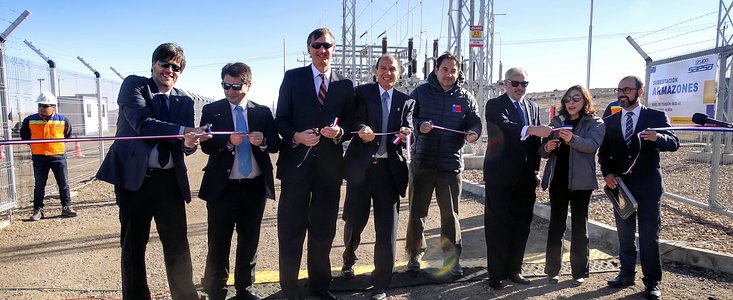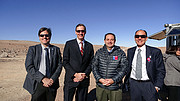Meddelande
Chilean Minister of Energy Sees Paranal Connect to National Electricity Grid
4 augusti 2017
The Chilean Minister of Energy, Andrés Rebolledo, recently attended a ceremony marking the connection of ESO’s Paranal and Armazones sites, the latter being where the Extremely Large Telescope (ELT) will be located, to the Chilean national electricity grid. The new electricity supply will reduce costs and reduce the observatory’s carbon footprint.
Minister Rebolledo remarked on the importance of this development as an example of the capability of Chile’s electricity network and its ability to provide a safe, high-quality supply of energy for cutting-edge astronomical research.
Roberto Tamai, the ELT Programme Manager, who was the Project Manager for this ESO upgrade, thanked the Chilean government and institutions for helping to create the energy infrastructure that will underpin progress on the ELT site. With its 39-metre main mirror the construction of the ELT is a demanding technological and engineering challenge. Tamai stressed that the electricity supply is a key part of the infrastructure that will enable us to address some of the biggest questions: Where did we begin? Where will we end? Are we alone in the Universe?
The connection of the Paranal and Armazones sites to the Chilean electricity grid was made possible by Grupo SAESA, the company that is now responsible for delivering permanent and sustainable energy to the Paranal Observatory and to the ELT site. As the site is so remote, 130 kilometres from Antofagasta in the middle of the Atacama Desert, the project presented significant challenges; but it was successfully completed thanks to the efforts of more than 300 workers. The result includes a 66-kilovolt transmission system, 50 kilometres long, with two new substations: one at Paposo (220/66kV), called the Paranal substation; and the other between Paranal and Armazones (66/23kV), called the Armazones substation.
This connection will also reduce the carbon footprint of the Paranal and Armazones sites, as they will no longer use fossil fuels in generators to provide power. In his address, Roberto Tamai remarked that the expansion of the electric grid brought the additional benefit of being able to take advantage of the abundant sunlight to produce clean energy that can be injected into the national electricity system.
The ELT will use the Universe as the ultimate scientific laboratory, making observations currently unachievable by any ground-based telescope to answer some of the most demanding astronomical questions of our time. The ELT is expected to see first light in 2024.
More Information
ESO is the foremost intergovernmental astronomy organisation in Europe and the world’s most productive ground-based astronomical observatory by far. It is supported by 16 countries: Austria, Belgium, Brazil, Czechia, Denmark, France, Finland, Germany, Italy, the Netherlands, Poland, Portugal, Spain, Sweden, Switzerland and the United Kingdom, along with the host state of Chile. ESO carries out an ambitious programme focused on the design, construction and operation of powerful ground-based observing facilities enabling astronomers to make important scientific discoveries. ESO also plays a leading role in promoting and organising cooperation in astronomical research. ESO operates three unique world-class observing sites in Chile: La Silla, Paranal and Chajnantor. At Paranal, ESO operates the Very Large Telescope and its world-leading Very Large Telescope Interferometer as well as two survey telescopes, VISTA working in the infrared and the visible-light VLT Survey Telescope. ESO is also a major partner in two facilities on Chajnantor, APEX and ALMA, the largest astronomical project in existence. And on Cerro Armazones, close to Paranal, ESO is building the 39-metre Extremely Large Telescope, the ELT, which will become “the world’s biggest eye on the sky”.
Länkar
- Map showing the Paranal and Armazones grid connections
- Green ESO information
- Read more about ELT on the ESO website
- Latest news and press-releases about the ELT
- ELT FAQ page
- Images and videos of the ELT
- Roberto Tamai’s speech (in Spanish only)
Kontakter
Richard Hook
ESO Public Information Officer
Garching bei München, Germany
Tel: +49 89 3200 6655
Email: rhook@eso.org
Om meddelandet
| ID: | ann17049 |
Our use of Cookies
We use cookies that are essential for accessing our websites and using our services. We also use cookies to analyse, measure and improve our websites’ performance, to enable content sharing via social media and to display media content hosted on third-party platforms.
ESO Cookies Policy
The European Organisation for Astronomical Research in the Southern Hemisphere (ESO) is the pre-eminent intergovernmental science and technology organisation in astronomy. It carries out an ambitious programme focused on the design, construction and operation of powerful ground-based observing facilities for astronomy.
This Cookies Policy is intended to provide clarity by outlining the cookies used on the ESO public websites, their functions, the options you have for controlling them, and the ways you can contact us for additional details.
What are cookies?
Cookies are small pieces of data stored on your device by websites you visit. They serve various purposes, such as remembering login credentials and preferences and enhance your browsing experience.
Categories of cookies we use
Essential cookies (always active): These cookies are strictly necessary for the proper functioning of our website. Without these cookies, the website cannot operate correctly, and certain services, such as logging in or accessing secure areas, may not be available; because they are essential for the website’s operation, they cannot be disabled.
Functional Cookies: These cookies enhance your browsing experience by enabling additional features and personalization, such as remembering your preferences and settings. While not strictly necessary for the website to function, they improve usability and convenience; these cookies are only placed if you provide your consent.
Analytics cookies: These cookies collect information about how visitors interact with our website, such as which pages are visited most often and how users navigate the site. This data helps us improve website performance, optimize content, and enhance the user experience; these cookies are only placed if you provide your consent. We use the following analytics cookies.
Matomo Cookies:
This website uses Matomo (formerly Piwik), an open source software which enables the statistical analysis of website visits. Matomo uses cookies (text files) which are saved on your computer and which allow us to analyze how you use our website. The website user information generated by the cookies will only be saved on the servers of our IT Department. We use this information to analyze www.eso.org visits and to prepare reports on website activities. These data will not be disclosed to third parties.
On behalf of ESO, Matomo will use this information for the purpose of evaluating your use of the website, compiling reports on website activity and providing other services relating to website activity and internet usage.
Matomo cookies settings:
Additional Third-party cookies on ESO websites: some of our pages display content from external providers, e.g. YouTube.
Such third-party services are outside of ESO control and may, at any time, change their terms of service, use of cookies, etc.
YouTube: Some videos on the ESO website are embedded from ESO’s official YouTube channel. We have enabled YouTube’s privacy-enhanced mode, meaning that no cookies are set unless the user actively clicks on the video to play it. Additionally, in this mode, YouTube does not store any personally identifiable cookie data for embedded video playbacks. For more details, please refer to YouTube’s embedding videos information page.
Cookies can also be classified based on the following elements.
Regarding the domain, there are:
- First-party cookies, set by the website you are currently visiting. They are stored by the same domain that you are browsing and are used to enhance your experience on that site;
- Third-party cookies, set by a domain other than the one you are currently visiting.
As for their duration, cookies can be:
- Browser-session cookies, which are deleted when the user closes the browser;
- Stored cookies, which stay on the user's device for a predetermined period of time.
How to manage cookies
Cookie settings: You can modify your cookie choices for the ESO webpages at any time by clicking on the link Cookie settings at the bottom of any page.
In your browser: If you wish to delete cookies or instruct your browser to delete or block cookies by default, please visit the help pages of your browser:
Please be aware that if you delete or decline cookies, certain functionalities of our website may be not be available and your browsing experience may be affected.
You can set most browsers to prevent any cookies being placed on your device, but you may then have to manually adjust some preferences every time you visit a site/page. And some services and functionalities may not work properly at all (e.g. profile logging-in, shop check out).
Updates to the ESO Cookies Policy
The ESO Cookies Policy may be subject to future updates, which will be made available on this page.
Additional information
For any queries related to cookies, please contact: pdprATesoDOTorg.
As ESO public webpages are managed by our Department of Communication, your questions will be dealt with the support of the said Department.


